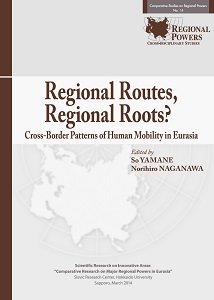
Comparative Research on Major Regional Powers in Eurasia - Paper 2
Comparative Research on Major Regional Powers in Eurasia - Paper 2
The papers included in this volume were presented at the international symposium, “The Elusive Balance: Regional Powers and the Search for Sustainable Development”, which was held at the Slavic Research Center on July 9 – 10, 2009. This symposium was a part of the five-year Grants-in-Aid project, “Comparative Research on Major Regional Powers in Eurasia”, sponsored by the Ministry of Education and Sciences of Japan. By “regional powers”, we mean China, India, Russia and other large-scale countries, that have emerged as political and economic powers recently and are competing with old powers like the USA, the EU and Japan. In the first part of this volume, the authors identify the long-term features of economic development of England, India, Japan and China in a comparative perspective. The readers can find some interesting viewpoints different from traditional ones to consider the economic history of these countries. There are also some hints for considering the long-term economic history of Russia. In the second part, the authors describe the macro economic structure of China, India and Russia by examining balance of payments statistics and macro and factory-level statistics. We can identify the structural differences of the three regional powers by the evidences provided by valuable and interesting statistics. In the third part, the authors depict the situation of poverty in China, India and Russia. Both authors employ a strict method of econometrics, which allows us to consider the problems of poverty in a wider context. The fourth part examines the problems of energy and environment in China, Russia and Japan. The authors utilize a method of political economy, which takes into account some political motives of individuals and institutions in coping with the problems concerned. By doing so, they have succeeded in illustrating interesting complexities of energy and environmental problems of the world.
More...
